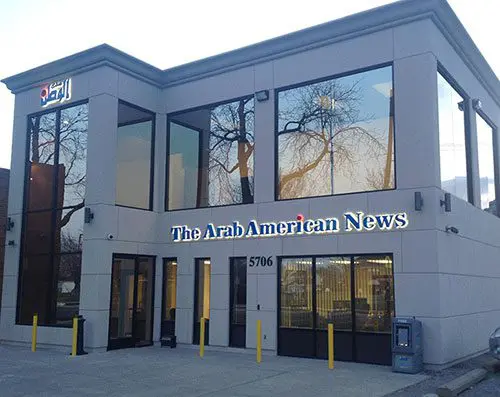Thinking is never wrong. Questioning is never offensive. Last week, our editorial “Questioning the wisdom behind Ashura procession” unfairly sparked outrageous, offended and offensive comments.
Unlike what an attention-seeking gossip Facebook page claimed, our editorial did not call for an end to Ashura processions. The article merely stated that observing Ashura with large demonstrations and black flags affects the image of our community and does not benefit the occasion itself.
People from within the Arab community in Metro Detroit are already calling for the boycotting of Dearborn’s businesses. A federal report that was leaked in August wrongly claimed that Dearborn has the second highest number of “known or suspected terrorists” in the country.
The commemorations of Ashura has nothing to do with terror. But as we stated in last week’s editorial, perceptions are often more important than reality.
The editorial also calls for honoring Imam Hussain’s sacrifice by standing with oppressed people around the world and linking his memory to contemporary causes.
Unfortunately, much of the negative feedback on the article came from people who did not read it.
Religious freedom is a right granted by the Constitution.
But the First Amendment that prohibits the government from interfering in the practice of religion also protects freedom of speech. Those who attacked us after the editorial’s publication asserted their right to freedom of religion, but discounted our right to speak.
All rights guaranteed by the Constitution are to be guarded from the government, not civilian criticism. We never said Shi’a worshipers do not have a right to organize processions or engage in any religious practice. These are rights protected by the Constitution. However, we used our own Constitutional rights to invite people to explore more practical ways of commemorating this grand occasion, including community service and spreading Imam Hussain’s message of combating injustice.
“Perhaps we mistreated Imam Hussain’s memory because we took the tragic aspect of his story and drenched ourselves in all his pain and wounds, but we were conservative in focusing on Hussain the revolution,” Grand Ayatollah Mohamad Hussein Fadlallah once said. “We want to commemorate all of Hussain, with his morals, his message, his ethics, his knowledge.”
Some reactions to the editorial confirmed the dangers of extremism that we described in our article. The editorial brought the radicalized zealots within the community to light.

“I wish whoever wrote this article get killed in a horrific accident and his daughters raped by ISIS,” commented Facebook user Tariq Nevayri on a page run by Majed Moughni, a lawyer who has made it a habit to embarrass our community.
Instead of condemnations, this comment received “LOLs” and cheers from other users.
Other hateful remarks included violent threats, attacking the character of our paper and publisher and appallingly divisive sectarian statements.
The radicalization of our youths is underway. Our community is going down a dangerous path. We call on our religious institutions and community organizations to quell this alarming wave of extremism by promoting tolerance and diversity of thought.
The terrifying atrocities in the Arab World are impacting people here. We should remain connected to our homeland, but in our local community we should not adopt the divisions and violence unfolding in our countries of origin.
“Takfiri” is a term that has been used lately to describe ISIS and other fundamentalist militant groups in the Middle East. It refers to people who consider others infidels.
Some comments on social media, particularly the scandalous Facebook page mentioned earlier, accused us of being enemies of Islam because of their disagreement with the editorial. The individuals who made those accusations are in the same “takfiri” camp as ISIS.
We know these takfiris— lousy as they may be— are a small fraction of our peaceful, diverse community, but they must be faced.
Many comments praising our editorial were “magically” disappearing from that Facebook page that shared the article three times and being replaced with inciting, distorting remarks.
“Frogs may bellow louder than bulls, but they cannot drag the plough in the field nor turn the wheel of the winepress, and of their skins you cannot make shoes,” Lebanese American philosopher Kahlil Gibran once said.
Extremists might make loud sounds, but they are useless.
In the editorial, we called for educating non-Muslims more about Ashura, so our fellow Americans know what we are commemorating. Our newspaper engaged in such efforts when we published a story titled, “What is Ashura, why do local Shi’a commemorate it?” on Oct. 10.
The editorial was written under “In our opinion”’ a section where we publish weekly articles that reflect the vision of the paper and its publisher, Osama Siblani. That is why the editorial did not have a byline.
We do not expect everybody to share our vision. After all, the purpose of opinion pieces is to start a discussion. However, we stand by every word in last week’s editorial.
Our pages in the newspaper and on social media are open to be a forum of a sincere, civil discussion. We welcome your views, even if they disagree with us. But we will not tolerate threats or bow down to intimidation.
“We will not sweep an issue under the rug because it is difficult to address. In the land of the First Amendment, we will not censor ourselves to avoid telling people what they don’t want to hear,” we pledged in an editorial at the end of 2013.
At the end of 2014, we renew this promise.
The Arab American News will continue to advocate for our common cause, write our community’s success stories and point out the shortcomings. We will continue to promote dialogue and acceptance among each other and fight bigotry and discrimination wherever they exist.
We thank our readers, advertisers, current and former employees for every issue that was printed this past year.
We wish you all a peaceful, productive 2015.






Leave a Reply